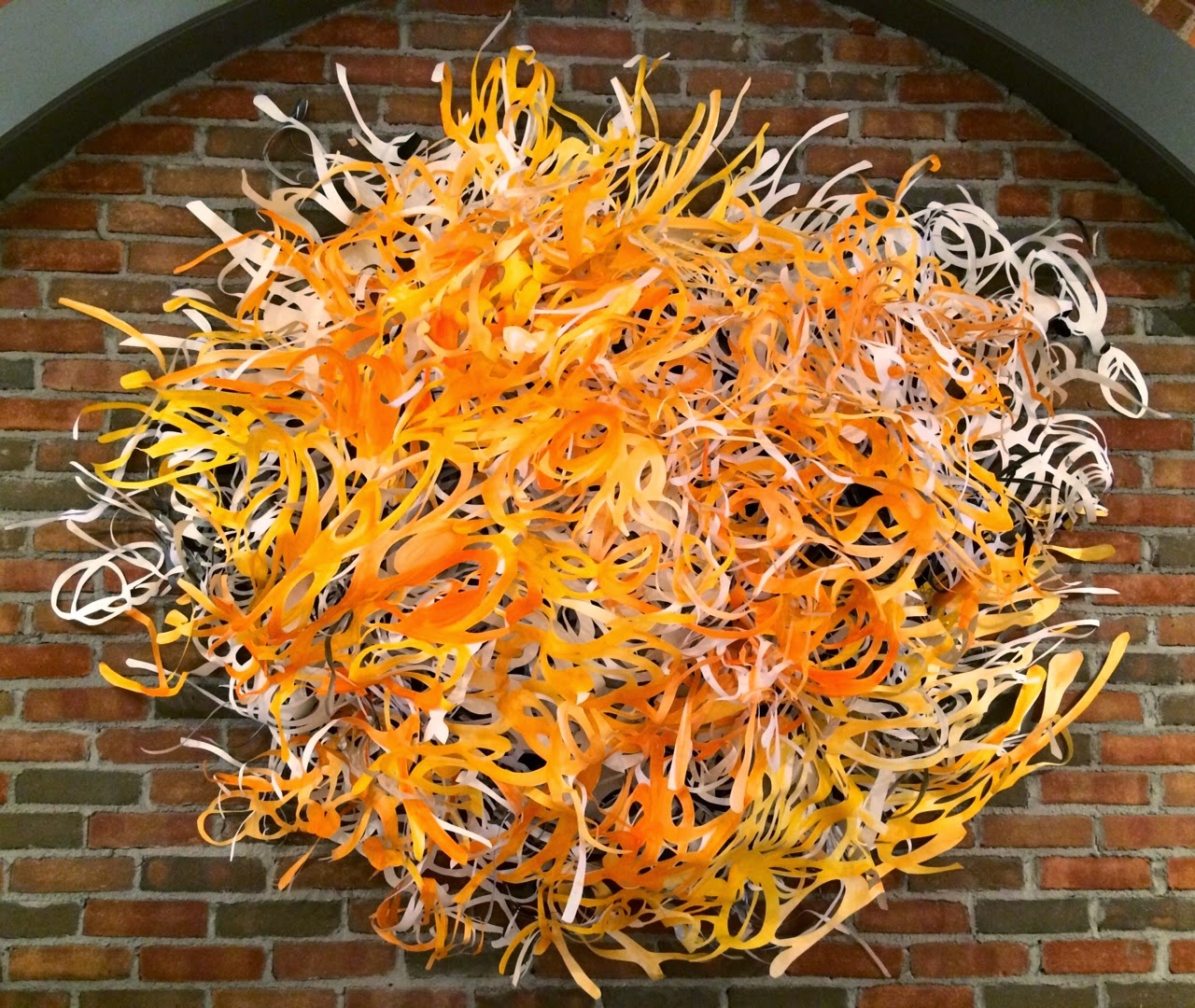 |
| Leah Wong, 2014. Tyvek cutout wall hanging with ink surface enhancement and shadows. Ca. 35 x 24" |
The swiftness of change is inspiring; the work itself is thrilling. Wong has presented herself as a painter in the two biannual shows I've seen, but now she shows paper cutting exclusively: small, three-dimensional cut paper tableaux in shadow boxes, and large cutout wall hangings with calligraphic ink drawing on their surfaces—the latter made from durable (and dustable) Tyvek, the same material used in home construction.
 |
| Leah Wong, 2014. Small shadow box with paper cutouts. |
 |
| Leah Wong, 2014. Small shadow box with paper cutouts. |
In dimensions both small and large, Wong's cutouts have the impetus and spontaneity of freehand drawing. The tendency for viewers of the larger works, especially, is to marvel over the painstaking labor of wielding the X-Acto knife for hour upon hour of precision cutting to produce lacy work on a great scale. And it should be no surprise that we wonder over levels of patience and skill that few of us possess.
 |
| Leah Wong, detail of Tyvek wall hanging. NB the way the surface texture of the material itself has a gestural quality that supports the energetic movement of the cutout and calligraphic painting. |
But the joy of Wong's work is that this controlled labor results in unfettered, dynamic gestures that zip through space. That the meticulous process results in such freedom and spontaneity in itself fills her work with life and significance. As Wong says in her artist's statement, "I explore the elements of volume, void, the gestures of hand on paper, light and shadow to transform and create new visual possibilities. The open-ended activity creates a conversation between lines and space." Not to mention, a conversation within the viewer, a push and pull of groundedness and yearning.
In the year past, Wong was invited to create two cut-out sculptures for a mall in Shanghai, where she also has a gallery. Workers built the armature, but Wong herself made each enormous piece by hand, the same way she makes every other piece—the shadow boxes and the wall hangings—with an X-Acto knife, cutting spaces with the material spread out across a work table so large that she has to stand on tip-toes to get a sense of how it's shaping up.
 |
| Leah Wong, 2014. Installation in Shaghai, China shopping mall. |
 |
| Point of comparison: Chinese antique carved rosewood box show in Ai Wei Wei's "According to What?" |
Why paper cutting? In her exemplary artist's talk at the opening of 360º, Wong explained that this is a traditional Chinese craft practiced by children. Throughout her own childhood, Wong would relax after school by sitting and cutting paper. When she attended China Academy of Art in Hangzhou, her attention was drawn to the foreign, and she undertook oil painting, for which there is nothing comparable in China. After marrying an American, she entered the MFA program at Ohio University as a painter. Faced with every artist's challenge to "know who you are," she struggled, but would relax and reflect by retreating to her childhood pastime of paper and scissors. Perhaps, she discovered, this had something to do with who she was?
Such exuberance, energy, and expansive definition in this work—all driven by heart and a daring spirit. It's highly enjoyable work, but it is much more than pretty. The powerful lines spin the viewer beyond the works' edges, launching us with their momentum into our own explorations, inner or outer.
The "knowing who you are" struck me in another way as I considered the one aggressively three-dimensional work in 360º, "Autumn Sunset."
 |
| Leah Wong, 2914. Installation, Autumn Sunset. Hand cut Tyvek. |
 |
| Night at the Chihuly Studio, Seattle, Washington. |
The Chihuly works are made in industrial workshops. Many artisans craft the elements of these sculptures, which Chihuly then selects and gathers together as a decorator fashions a bouquet. Wong's work develops organically from her own hand and eye. Every element of the sculpture is handmade. The cloud gathers, the sun bursts from her mind and process. So even when she makes similar pieces, the gestures and the energy have to be generated anew, every single time. They are never prefabricated, but discovered as they arise from the artist's vitality.
Will Wong find the force to make these forever? Few artists stay with one process, unchanged by new impulses drawing them in new directions. Wong seems to have a phenomenal fund of stored electrical excitement to be transferred into this work.
Starr, you always expand my thinking and appreciation. Thanks!
ReplyDelete